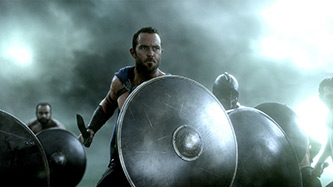You were a pretty savvy guy, and lived though a great age of Hellenic theater, so you're probably familiar with how the facts of history can be bent and stretched by a dramatist. And there's no better way to measure what values are held most sacred by a particular culture than to observe how those facts are bent and stretched. Back in 472 BCE when the Aeschylus dramatized the events of the Greco-Persian War in the The Persians, his concern was for divine retribution. Ideas of fate and morality were a popular theme back then (his play even won first prize at that year's Dionysian festival). You didn't get a mention in that one, but you're a big part of a new piece of drama--it's called 300: Rise of an Empire, and it's, uh…a movie. Which is like a play, but projected onto a wall. Like a living painting. You see, we've figured out how to refract light onto a surface in order to capture the image of…
Nevermind. What I wanted to tell you - because I thought you might be curious - is how you're being remembered here in the 21st Century.
Like The Persians, this is a sequel. The first story's protagonist was one of your contemporaries, the Spartan king Leonidas, and it (sort of) documented his death at the Battle of Thermopylae. This was created in 2006, and a country known as America (where the film was produced) had recently suffered a terrible tragedy. Such mass casualties are a rare occurrence here in the future, so in the air hung a distinct (but unspoken) desire for blood, which, in these enlightened times, expressed itself in strange ways. The original 300 was one of those ways. The story's most obvious themes - vengeance, martyrdom, hubris - were subsumed by a weird commixture of leitmotifs that included personal freedom and resistance to oppression (which you might find hilarious, since you lived through a time when the Spartans were the most oppressive oppressors the world had ever known).
In your day, military brinksmanship was guided by "Time"--which, roughly translated into contemporary English, means worth or honor._ Time_ was how you old-school Greeks measured yourselves against one another. As the historian J.E. Lendon writes in Song of Wrath (think of him as a sort of modern-day Thucydides): "Time was thought to have a real, almost physical existence within the world. It could be taken by one man from another; it could be captured in war."
Today, particularly in the West (way past the borders of the world you know), exceptionalism is the default mode of social, political and cultural discourse. We are responsible only for ourselves. Where that self-interest coincides with the interests of the larger global community, great! But, for the most part, we fight and die for our right to choose the conditions of our own immediate existence.
That's not entirely a bad thing. But it's a concept that I'm guessing you're unfamiliar with. Sure, Athens was the birthplace of democracy, and you were, in fact, one of its progenitors - a populist, a defender of the lower classes (a real man of the people, as we say nowadays) - but we think of democracy in much different terms now. We think of it in terms of freedom.
Indeed, as much as things change, they stay exactly the same. Freedom is the way we measure ourselves against other nations; the idea to which we have ascribed a physical realness that it does not possess; the thing we are constantly afraid might be taken from us by other men. It's our time.
So, what about this movie?
As a lifelong advocate for the Athenian navy, you'll be happy to know there are lots of boats. The film even begins - as most stories of Athens' rise to military greatness (most notably John Hale's amazing book Lords of the Sea) - with your speech before the Athenian council. Though, in this version, you're less concerned with the economics and logistics of building up Athenian naval power than you are with recruiting the Spartans to join your cause (yes, yes, I know; the inferior design of their warships made them practically useless beside your fast and agile _triremes, _but the storytellers need them in there for the sake of continuity).
What follows, as expected, is a blending and blurring of fact and fiction. We get a cool cameo from the Hellespont. And when you're drawn into battle, they show your ships arranged in the classic kyklos defensive formation. But I'm pretty sure you didn't hate-sex the Persian naval commander Artemesia on top of her war map. And I won't even ask if you did or didn't explode out of the ocean on a flaming horse to board an enemy ship and behead its commander…
But these are our modern myths, and this is how we tell them: in super slow-motion, in vibrant colors. The movie is rather beautiful, actually. The roiling oceans, the roiling clouds. Everything roils. Even the starscapes. In the opening scene, as you lead a charging regiment at the Battle of Marathon, lightning drips lazily from the sky in fluorescent zigzags. It's more affecting than perhaps it deserves to be.
The historical distortion most likely to displease you comes at the climax of the story (which is supposed to be the Battle of Salamis, though the tactic that led you to victory there - drawing the larger Persian boats into the straits where they became trapped among the rocks and made easy targets - occurs much earlier in the film). When all seems lost, the Greek boats smashed and sinking, you look towards the horizon and see…
Well, I'd rather not upset you. Just know that a couple hundred years after your time, the Latin phrase_ deus ex machina_ is invented in reference to the popular devices of Greek tragedy, and it applies here.
But maybe straying from the truth a bit isn't a bad thing. After all, the film ends with you charging heroically towards the camera, swinging your sword, cutting your way through the Persian hordes in kaleidoscopic gushes of blood. If it had been even twenty minutes longer, we might have gotten to the part where you were declared a traitor and exiled by your fellow Athenians. Or even far enough to depict your narrow escape into Asia Minor, where you made contact with Artaxerxes - the son of this film's vainglorious, gilded antagonist - and offered him your services. Yours was a happy ending, of sorts; Plutarch wrote that the honors you enjoyed in the Persian King's court were "far beyond those paid to other foreigners," and, unlike Leonidas, you passed away at a respectable old age and under peaceful circumstances.
So perhaps it's best to be remembered as you are in this film. As a freedom-fighter, a swordsman (in both meanings of the word), and rich in those traits we find so appealing in this modern age: youth, handsomeness, and possessed of finely articulated abdominal muscles.
Sincerely,

Jared







